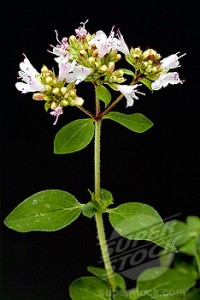 Oregano (Origanum vulgare) is a perennial, winter hard and herb like plant. The plant becomes 30 to 60 cm high. The leaves are oval, sharp, with a straight border and dark green. The leaves taste of pepper. Oregano flowers from July to September with white or pink flowers. Oregano is general to find in South-Limburg, next to roads and edges of the wood. It is a protected plant in the Netherlands and Belgium.
Oregano (Origanum vulgare) is a perennial, winter hard and herb like plant. The plant becomes 30 to 60 cm high. The leaves are oval, sharp, with a straight border and dark green. The leaves taste of pepper. Oregano flowers from July to September with white or pink flowers. Oregano is general to find in South-Limburg, next to roads and edges of the wood. It is a protected plant in the Netherlands and Belgium.
Oregano loves hot dry weather and grows well at high altitudes also. The active ingredients, found in the leaves, are the volatile oils thymol and carvacol. These oils have a complex, strong, and pleasant odor. Oregano is often thought of as a “pizza” herb.The medicinal qualities of oregano fall into two major categories: bronchial dilation and anti-microbial activity.Modern herbalists recommend infusions of oregano leaves for indigestion, headache, coughs and to promote menstruation. It is deemed both a tonic and a stimulant. Today, people still use oil of oregano for toothache, putting a few drops of the oil on the aching tooth to relieve pain. To this day, poultices of oregano leaves are used to soothe pain. Whether or not these remedies work has not been determined. You have to think that if these remedies have come down through the years as they have, there must be some truth in them. Тhe wild oregano is rich in minerals and contains calcium, magnesium, zinc, iron, potassium, copper, boron, and manganese. Vitamins C and A (beta carotene) and niacin are also found in oregano. But the key element in oregano is the oil with Carvacrol and Thymol as the primary components, which are believed to be the reason for Oregano oil’s fungicidal and worm-expellant properties. That is why Oregano oil is significant in the treatment of internal and external fungi including athlete’s foot and skin conditions such a psoriasis and eczema. treatment as well. Oregano is useful against bacteria and parasites and it has immense antiseptic powers are immense. It inhibits the growth of the majority of bacteria, and in case of parasites, oil of oregano has had success neutralizing worms, amoeba, and protozoan.
Oregano tea can be made from either fresh or dried oregano leaves.Oregano herb tea is prepared by steeping 1 teaspoon dried oregano herb in 250ml of boiling water for 10 minutes.
From our catalog you can order Oregano.
 Български
Български
Leave a Reply